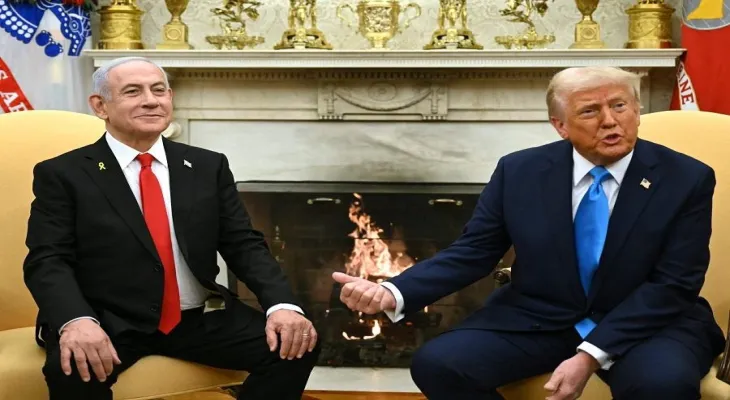Search here
Newspaper
Search here

Arab Canada News
News

Published: February 5, 2025
The former U.S. President Donald Trump stirred up a storm of international criticism after he suggested the relocation of Palestinian residents of the Gaza Strip to other places and placing the strip under U.S. control with the aim of transforming it into “the Riviera of the Middle East” through massive economic projects.
Trump's Controversial Plan
Trump pledged in statements published by U.S. media that the United States would work on resettling Palestinians outside the Gaza Strip and controlling the area for economic development, considering that this would be the “optimal solution” to end the conflict.
Trump's statements came amid escalating crisis in the Gaza Strip due to the ongoing war, raising concerns of rising tensions and hindering international efforts for reconstruction and achieving a sustainable ceasefire.
Hamas Rejects and Threatens
The Hamas movement responded to Trump's statements in a harsh tone, where Sami Abu Zuhri, a movement leader, described the U.S. proposals as “ridiculous and absurd,” warning that any attempt to implement them “could ignite the entire region.”
Hamas affirmed that the Gaza Strip is purely Palestinian land and that any attempts to relocate its residents will be met with fierce resistance, deeming such ideas a reflection of U.S. support for the Israeli occupation and entrenching the policy of forced displacement of the Palestinian people.
Germany Rejects and Washington Remains Silent
On the international level, Germany was one of the first countries to express its complete rejection of Trump's statements, with German Foreign Minister Annalena Baerbock asserting that Gaza belongs to the Palestinians and that expelling them from it contradicts international law.
Baerbock stated in an official statement:
“Such proposals will lead to more suffering and hatred, and no solution can be accepted that ignores the Palestinians and their rights.”
As for the current U.S. administration under President Joe Biden, it has not issued any official comment on Trump's statements, but sources in the U.S. State Department confirmed that the official U.S. policy does not support forced relocation and that Washington supports the two-state solution, a stance that seems reserved compared to other international positions.
The Arab Stance: Firm Rejection and Warnings of Escalation
In the Arab world, several countries condemned the U.S. statements and considered them a serious threat to regional stability.
• Jordan: Jordanian Foreign Minister Ayman Safadi confirmed his country's “firm rejection” of any plans aimed at changing the demographic composition of Gaza, emphasizing that “forced displacement is a war crime under international law.”
• Egypt: Egyptian Foreign Minister Badr Abdel-Aty stressed the necessity of “proceeding with reconstruction and bringing humanitarian aid into Gaza at an accelerating pace, without the Palestinians leaving the strip,” in a clear indication of rejecting any resettlement plans.
• Gulf Countries: Saudi Arabia, Qatar, and the UAE issued statements affirming their support for the rights of the Palestinian people and their rejection of any projects aimed at their displacement or changing the demographic map of the strip.
Palestinian Diplomatic Moves to Contain the Crisis
Amid these developments, Palestinian President Mahmoud Abbas arrived in the capital Amman on Wednesday morning to meet with Jordanian King Abdullah II, where the meeting is expected to address recent developments in Gaza, the U.S. proposals, and ways to counter any attempts to displace residents.
Simultaneously, Palestinian Prime Minister Mohammad Mustafa traveled to Cairo on Tuesday, where he held consultations with Egyptian officials to coordinate relief plans for Gaza. The Palestinian Authority had announced days ago the formation of a new government committee to manage the strip, in a step aimed at reinforcing Palestinian official presence there in the face of any external attempts to impose solutions.
The International Community Escalates Against Relocation Plans
On the international level, Trump's statements faced widespread condemnations from the United Nations and the European Union, where UN spokesman Stefan Dujarric warned that “any attempt to impose mass displacement on the residents of Gaza would be a gross violation of international humanitarian law.”
The European Union also issued a statement affirming that “the only acceptable solution to the conflict is the two-state solution, and any proposals regarding the displacement of Palestinians are absolutely rejected.”
Scenarios of Escalation and Fears of Serious Repercussions
These developments come at a time when Gaza is experiencing an unprecedented humanitarian disaster due to the ongoing war, with more than 2.3 million Palestinians suffering from shortages of food, water, and medicine amidst the destruction of the strip's infrastructure.
As international outrage grows over the suggestions to displace Palestinians, diplomatic entities warn that raising such ideas may lead to a new escalation in the region, especially with Palestinian factions confirming that they will not accept any attempts to force residents to leave the strip.
In conclusion: Widespread International Rejection and Potential Escalation
It seems that Trump's statements regarding Gaza have opened a new chapter in the crisis, facing widespread Arab and international rejection, while the Palestinian Authority is seeking to intensify diplomatic moves to contain the situation.
As the region anticipates clearer American steps regarding these statements, the question remains: Will these proposals lead to a new political and military escalation in Gaza, or will they be contained through international pressures?
Comments